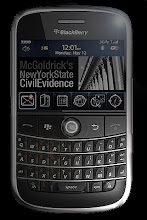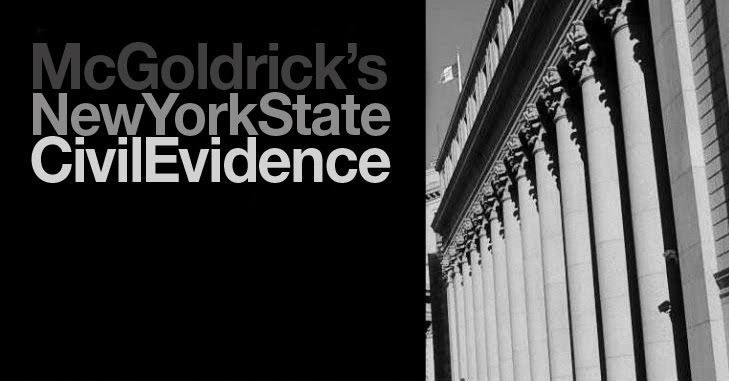At trial in Bronx County Supreme Court, plaintiff successor of deceased patient who was treated in defendant hospital's emergency room sought to lead expert testimony from an internal medicine doctor who did not express he had a background or knowledge in emergency medicine. The Supreme Court declined to allow that doctor's expert testimony. The First Department unanimously reversed and allowed the plaintiff''s expert doctor's testimony in Ocasio-Gary v Lawrence Hosp. 2010 NY Slip Op 00003.
"The trial court should not have rejected the expert's opinion on the ground that the expert failed to expressly state that he or she possessed the requisite background and knowledge in emergency medicine to render an opinion. The expert, who is board certified in internal medicine, is qualified to render an opinion as to diagnosis and treatment with respect to the symptoms presented by the decedent. In contrast, the expert's affirmation in Browder v New York City Health & Hosps. Corp. (37 AD3d 375 [2007]), cited by the trial court, failed to indicate either the expert's specialty or that he or she possessed the requisite knowledge to furnish a reliable opinion."
In the cited case of Browder v New York City Health & Hosps. Corp. (37 AD3d 375 [2007]) First Department had held:
"In opposition to defendant's prima facie showing based on the hospital records, the deposition testimony and the affirmation of an expert pediatric urologist with many years of experience in that field, plaintiff in this medical malpractice action failed to raise an issue of fact. The affirmation of plaintiff's purported expert was insufficient since it did not indicate either the affiant's specialty or that he or she possessed the requisite background and knowledge to furnish a reliable opinion (cf. Joswick v Lenox Hill Hosp., 161 AD2d 352, 354-355 [1990]). The affidavit was also insufficient since it failed to address the detailed affirmation of defendant's expert, addressed the alleged departures from the standard of care and proximate cause only in conclusory terms, was contradicted by the record (see Wong v Goldbaum, 23 AD3d 277, 279-280 [2005]), was based on a hospital record notation whose source was unknown and thus inadmissible (see Quispe v Lemle & Wolff, Inc., 266 AD2d 95, 96 [1999]), and was otherwise lacking in evidentiary foundation. We decline to address plaintiff's unpreserved spoliation argument."
skip to main |
skip to sidebar



About The Author
- Gregory McGoldrick, Esq.
- Gregory McGoldrick, Esq., of the New York State Bar.
Since 2009, McGoldrick's New York State Civil Evidence, The Original New York Evidence Resource For Civil Practice Counsel - Straight To Your Android, BlackBerry or iPhone.
Table of Contents
- "human factor" standard
- "legally sufficient" evidence standard
- "utterly irrational" standard
- 1st Dept
- 2nd Dept
- 3rd Dept
- administrative proceeding
- admission in deposition testimony
- admission in former pleading
- admission in pleadings
- admissions against interest
- adverse inference limitation
- affidavit contrary to deposition testimony
- affidavit of service
- App Term 1st Dept
- appeal of directed verdict
- appeal of trial court's discretion
- burden of proof
- business records exception
- child support
- contempt
- contract of insurance
- cooperation clause
- Court of Appeals
- CPLR 2106
- CPLR 3101
- CPLR 3211
- CPLR 3212
- CPLR 4506
- CPLR 4506(1)
- CPLR 4513
- CPLR 4518
- CPLR 4518(a)
- CPLR 503(a)
- CPLR 5501
- criminal conviction
- damages based on probability
- Domestic Relations Law 245
- eavesdropping
- Education Law 6512
- email transmission
- exception to rule against hearsay
- excited utterance
- existence of liability insurance
- expert opinion based on independent report
- expert testimony
- expert witness
- felon witness
- former testimony
- foundation
- FRE 801(d)(2)(B)
- government agency guidelines
- hearing on service
- husband and wife
- implied revocation of authority
- incidental admission
- inconsistent facts
- inconsistent facts in expert testimony
- industry standards
- informal admission
- Insurance Law 5102(d)
- insured's statement to insurer
- intercepted communication
- judicial admission
- Judiciary Law 756
- medical expert
- medical records
- negligence
- negligent design
- New York State CPLR Civil Evidence Resource
- non mandatory guidelines
- Notice of Claim
- notice of condition
- official documents
- oral testimony in support of written Notice of Claim
- particularity
- Penal Law 156.10
- Penal Law 250.05
- photographs
- pleadings
- police accident report
- preclusion of expert witness
- present sense impression
- prevailing standards
- prima facie case of negligence
- prior conviction on plea
- prior notice of condition
- professional reliability exception
- proof of service
- qualification of expert witness
- qualification of expert witness\
- rebuttal of proof of service
- redaction of hospital records
- relevance of conviction to issue
- remoteness of time
- res ipsa loquitur
- retraction of admission
- rule against hearsay
- Section 50-H Examination of Claim
- Section 50-H General Municipal Law
- self-authentication
- serious injury
- spoliation of evidence
- stored communication
- summary judgment
- terms of request made of witness
- triable issue of fact
- unsworn expert evidence
Disclaimer
The information in this site is published as an interim point of reference for civil litigation counsel in the state of New York. There is nothing in this site that should be taken by you to be legal advice. Accessing or reading the information in this site does not create an attorney-client relationship between you and the author.
Return to McGoldrick's New York Civil Evidence
Since 2009, The Original New York Evidence, Disclosure & E-Discovery, and Deposition Practice Resource for Civil Practice Counsel - Straight To Your Android, BlackBerry, iPhone or iPad.
Since 2009, The Original New York Evidence, Disclosure & E-Discovery, and Deposition Practice Resource for Civil Practice Counsel - Straight To Your Android, BlackBerry, iPhone or iPad.
